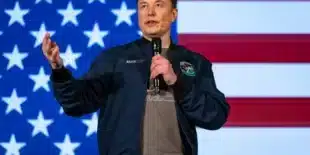World leaders gathered in Switzerland on Saturday for the first summit on peace in Ukraine, following Vladimir Putin’s demand that Kyiv effectively surrender if it wants to negotiate with Moscow.
The two-day event at the luxurious Burgenstock resort includes Ukrainian President Volodymyr Zelensky and more than 50 other heads of state and government, but Russia is not participating.
Switzerland aims to lay the groundwork for a future peace process involving Moscow. However, on Friday, Russian President Vladimir Putin dismissed the summit as a “trick to distract everyone.” He stated that Moscow, which launched a full-scale invasion of Ukraine in February 2022, would cease fire and begin peace talks “immediately” if Kyiv withdrew its troops from the east and south and abandoned its NATO membership bid.
Zelensky condemned Putin’s demands as a territorial “ultimatum” akin to those of Adolf Hitler. NATO and the United States also promptly rejected these conditions.
After nearly a year of stalemate, Ukraine had to abandon several frontline settlements this spring, with Russian forces holding significant advantages in manpower and resources. However, since mid-May, Russian advances have slowed, and Zelensky hopes to gain momentum with the back-to-back G7 and peace summits.
### G7’s $50 Billion Loan and Security Deal
At the G7 summit in Italy, which Zelensky attended, leaders announced a new $50 billion loan for Ukraine, funded by the interest on frozen Russian assets. The Group of Seven nations pledged to support Ukraine “for as long as it takes.”
Zelensky said the loan would support both defense and reconstruction efforts, while Putin criticized the move as “theft” and warned it would “not go unpunished.”
Additionally, a landmark 10-year security deal was signed by Zelensky and U.S. President Joe Biden, which includes U.S. military aid and training for Ukraine. Zelensky described this agreement as a bridge to NATO membership.
Biden will not attend the summit in Switzerland, sending Vice President Kamala Harris in his place. Other G7 leaders, including those from Britain, Canada, France, Germany, Japan, and Italy, are expected to attend.
The Summit on Peace in Ukraine seeks to have the 92 attending countries agree on a final declaration outlining basic principles.
Russia’s BRICS allies, Brazil and South Africa, are sending only an envoy, and India will be represented at the ministerial level. China will not participate without Moscow’s presence.
### Finding Common Ground
The summit is being held at the exclusive Burgenstock hotel complex, which overlooks Lake Lucerne. The gathering will focus on narrow themes based on Zelensky’s 10-point peace plan from late 2022 and U.N. resolutions on the war.
The summit aims to establish a framework for lasting peace in Ukraine, based on international law and the United Nations Charter. Experts caution against expecting too much from the event.
The International Crisis Group stated that meaningful negotiations are still out of reach, as both Kyiv and Moscow are committed to outlasting each other. They believe the summit may yield little more than reaffirmations of the U.N. Charter’s principles of territorial integrity.
### Focus on Key Issues
On Saturday, a plenary session will involve all delegations. Sunday will feature detailed discussions on nuclear safety, freedom of navigation and food security, and humanitarian issues, including Black Sea shipping, prisoners of war, civilian detainees, and deported children.
A second summit is planned, and Zelensky’s chief of staff, Andriy Yermak, expressed hope that Russia would attend and receive a “joint plan” from the other attendees.
The Burgenstock mountain’s location makes it relatively easy to secure from physical threats. However, the Swiss government has reported repeated cyberattacks on its websites leading up to the summit and noted an increase in misinformation.
Samuel Charap, a Russia expert at the RAND think tank, noted that Russia’s clear opposition to the summit indicates its concern about expanding the pro-Ukraine coalition. “Avoiding the expansion of the pro-Ukraine coalition: they’re concerned about this,” he told AFP.


